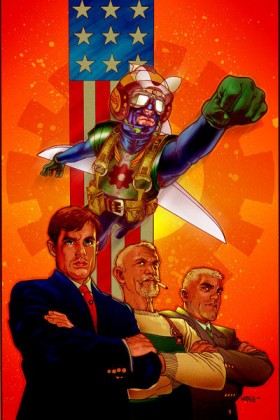| Ex
Machina: The First Hundred Days
I really
hate politics. I don’t mean that I hate one particular
party or politician, or that I find myself leaning toward
one political ideology in particular. I mean that I hate
the whole freaking system. Elections, NGOs, lobbyist, Senate,
the House of Representatives: it all just irks me.
And
it’s not just the American government; I’m as
equally annoyed with every type of governing body known
to man, mostly because I think all government runs on the
principle that people will somehow manage to not find new
and interesting ways to circumvent any system they find
themselves in and summarily screw over their neighbor. In
fact, the best system of government I’ve ever heard
of was one I believe the Vikings used, wherein the two disputing
parties would go out in the middle of a bridge, and the
last man left standing on the bridge won the argument. Sweet
wonderful simplicity.
My utter
dislike of government makes liking books like Ex Machina
somewhat difficult, as there is a ridiculous amount of bias
that I have to overcome to be objective. Thankfully, the
effort put forth by Brian K. Vaughan and Tony Harris made
it almost easy to love their story of the new New York City
mayor dealing with crisis after crisis, as well as his former
career as the world’s first superhero.
Mitchell
Hundred was just a civil engineer when he was exposed to
some type of glowing mechanism that gave him control over
complex mechanisms and machines. Soon after, he donned a
menagerie of gadgets and armor to become the world’s
first superhero, The Great Machine, but found quickly that
all he did was maintain the status quo. So, he unmasked,
ran for Mayor of NYC, and won by a landslide. And that’s
where our story starts.
Vaughan
takes a storytelling style like that found in NBC’s
The West Wing, showing us the man in power, as
well as some specific scenes involving key members of his
staff, but by using the mayoral setting, is allowed more
leeway in crafting more interesting plots. Whereas The
West Wing is far too often bogged down in more political
jargon and far-too-current events, Ex Machina balances
well the duties of the mayor’s office with the action
subplot and the back-story involving The Great Machine,
and finds a way to make the unveiling of some controversial
artwork at the Brooklyn Museum of Art just as intriguing
as a murder spree in a blizzard. I’m also fond of
Vaughan’s characterization of Mitchell Hundred and
the supporting cast of his staff. Well-defined personalities
are the norm here, almost to the point where I can tell
which character is speaking from dialogue alone.
What’s
most interesting about Vaughan’s story here is that
it is oddly light as far as intense moroseness and drama,
but still manages to be horribly sinister. The reader is
clearly meant to follow the story arc as it ebbs and flows
and shifts focus from one of the three subplots, but Vaughan
injects several brief plot points that highlight what could
be a serious underpinning plot thread of tragedy for the
protagonist. Much of Hundred’s past as the Great Machine
is unknown to the reader, and while it seems obvious his
superheroic career was short-lived, there were several places
in his past where the character feels haunted by mistakes.
References to the World Trade Center and a murderer named
Jack Pherson crop up, as well as some strange imagery, helped
by Tony Harris’ art, involving Hundred’s mother.
His
term in office may seem bright and cheerful (as bright and
cheerful being the Mayor of NYC could be), but Vaughan seems
to be pushing this a little too hard; perhaps commenting
on the facile nature of what it takes to make it politics.
Vaughan creates a very subtle dichotomy for the reader to
observe about Mitchell Hundred: there’s the Mitchell
you know, that you read about, and the Mitchell you don’t
know, that is suggested. And the best part is that it plays
out only in minor traces and steadily throughout the comic,
while never being obvious. Intricacy of plotting, thy name
is Vaughan.
Tony
Harris, it is good to have you back. Since his departure
from Starman, I’m glad to see him working
on a regular monthly series again. His artistic style has
changed much from his Starman days and has even
become sharper since his work on JSA: The Liberty File.
This is crisp, clean artwork that is distinctive in its
emotive ability and facial variation. Harris almost personifies
the kind of artwork that I think should be the mean for
comics: just plain good, reliable at all times artwork.
Harris’s emotive style also matches well the talking-heads
nature of the book, as much of the plot involves dialogue
and little action, but when the action pops up, Harris continues
to perform well is visually relating movement and scope.
Also
of note is the coloring from J.D. Mettler. Color plays an
important part in the book, as flashbacks occur regularly
and Mettler gives understated nuance to these scenes, making
their colors a little richer and more “homey”
to invoke the idea of “past.” Mettler also works
the environment well with his color schemes, making night
and wintry conditions vibrant and textured, and adding highlights
to the plots points mentioned earlier with eerie tones of
pale green.
It’s
a great collection and highly creative in its presentation,
which is something I’m coming to expect from the more
high-profile projects coming out of Wildstorm/DC nowadays.
Well worth the $9.95 for the first five issues, as well
as a behind-the-page section where Tony Harris shows off
his creative process involving photo reference. Go and buy
and finally find a governmental candidate that is both interesting,
intelligent, and can be bought for ten bucks. If only they
were all so cheap.
Ex
Machina: The First Hundred Days
|






